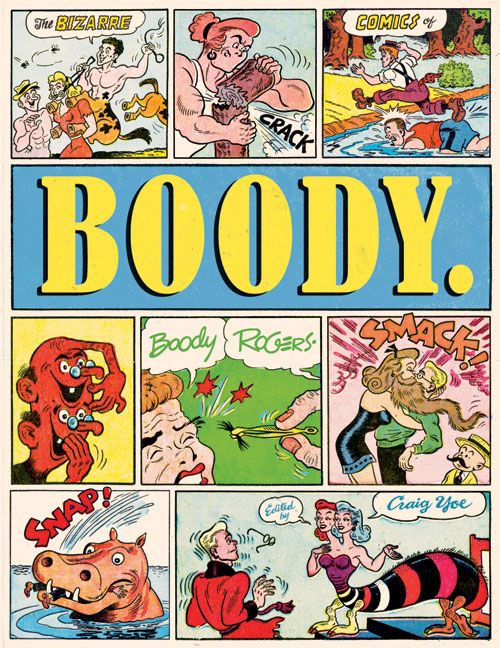• Let's begin by directing your attention to the comments section of this post on the Comics Comics blog regarding my recent interview with Dan Nadel. It devolves into a conversation over Nadel's earlier comments about Fantagraphics' recent Boody Rogers book, edited by Craig Yoe. Nadel disliked the book for a number of reasons, which Tom Spurgeon had felt was inappropriate for him to discuss in public, since Nadel had written and edited a book that featured Rogers' art, Art Out of Time, and thus, was suffered from a conflict of interest of sorts.
Anyway, Nadel, Rob Clough, Tim Hodler, Jeet Heer, Spurgeon and even Gary Groth (!) hash the whole matter out here, though little is resolved by the end. I haven't read the Rogers collection yet, so it's hard for me to gauge the accuracy of Nadel's comments. Spurgeon makes some good points, but I'm not 100 percent convinced they are that germane to Nadel's original post. Still, it's an interesting discussion nevertheless.
• Speaking of that Boody Rogers book, John Mitchell didn't care much for the book either, though for different reasons, labeling it a "patience tester."
• Going back to Comics Comics for a sec, Tim Hodler dredges up the old "are comics more like movies or literature" question, and adds a few references to Godard and Samuel Delany just for good measure.
• Hey, Abhay Khosla is back! And this time he's reviewing Chris Blain's Gus and His Gang! And by reviewing, I mean throwing in constant asides to Benny Hill, Seinfield, Waterworld, Woody Allen and anal probes that nevertheless manage to perfectly capture the spirit of the initial work in question. Oh, just go read the thing.
• The Walrus looks at the career and art of Joost Swarte.
• What do Grant Morrison and the director of Ghost in the Shell have in common? Jog spells it out for you.
• Brandon Soderberg makes a pretty good case for why Disappearance Diary is awesome.
• Johanna Draper Carlson does not like anthologies:
My least favorite kind of anthology is when a group decides to put out an anthology to draw attention to themselves or even for a charitable purpose. In these cases, the contents can be of widely varying quality. They give the impression that they don’t have many submission guidelines, or that knowing the right people overrides standards of entry, or that good intentions (helping out someone in need) can take the place of good work.
• Vice magazine has started to run comic reviews, which should have the folks at the AV Club looking over their shoulder. Maybe they'll actually decide to give a book a B-!
• Angelina Jolie liked The Photographer, so you know it must be good.


